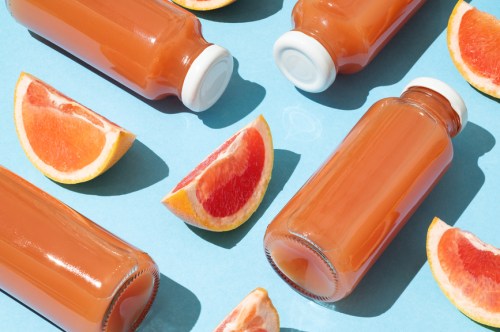If You Take Daily Medications, You Might Need To Pass on the Grapefruit Juice
When it comes to grapefruit juice, which is arguably delicious, it's important to know that it interacts with some medication.

We often celebrate citrus fruits for their delicious tangy flavors and health-promoting attributes. Even though a Spicy Grapefruit Paloma with a salted rim is delicious (even without tequila), consuming grapefruit can actually interact poorly with prescription and over-the-counter medication like allergy pills, blood pressure meds and antidepressants. This interaction could be less severe, simply rendering your allergy meds useless, or it could cause something resembling a withdrawal experience.
Experts in This Article
medical toxicologist and co-medical director of the National Capital Poison Center
This grapefruit-related phenomenon was initially reported in a 1989 study investigating the potential interactions between ethanol and felodipine, a drug used to treat blood pressure, says Kelly Johnson-Arbor, MD, FACEP, FUHM, FACMT, medical toxicologist and co-medical director of National Capital Poison Center. In this study, participants were given a placebo or ethanol mixed with grapefruit juice to mask the taste, followed by a dose of the blood pressure drug.
Surprisingly, the results were almost the opposite of what researchers expected, Dr. Johnson-Arbor explains. What researchers found that day, and continue to find, is that although there are many benefits of grapefruit, the citrus can impact the metabolization of drugs in both directions: creating too much or too little of a dose in the bloodstream.
Why does this interaction occur
Grapefruit contains a natural compound called ‘furanocoumarins,’ Dr. Johnson-Arbor explains. Furanocoumarins are natural compounds that help citrus plants defend against insects and other stressors. But, the prominent furanocoumarins in grapefruit are also known to block the activity of intestinal enzymes that assist in the breakdown of many medications in humans, Dr. Johnson-Arbor explains.
These enzymes, known as “cytochrome P450 3A4”, are involved in the metabolism of numerous prescription and over-the-counter drugs, including Allerga, the allergy medicine, statins (which control blood pressure), and Buspar (which is often prescribed for anxiety), Dr. Johnson-Arbor says. When people who take these medications drink grapefruit juice or consume fresh grapefruit, the body may not break down the medicine normally, leading to unwanted side effects and even toxicity, depending on the drug. (The medication list is, unfortunately, extensive, but you can find out about your medicines by using the interaction mechanism on websites like Drugs.com.)
Dr. Johnson-Arbor explains that grapefruit juice also affects a protein system that helps transport drugs back and forth across cells in our bodies. Grapefruit juice’s halting effects on this system can result in higher or lower levels of medications within the body, which can cause both adverse side effects and/or decreased medication effectiveness, depending on the individual. This is concerning when you consider that the drug impacts the efficacy of medications like antidepressants and can cause significant withdrawal-like side effects.
How to protect yourself
Everyone is different, Dr. Johnson-Arbor says. Some people might be able to consume grapefruit and have no impact on their medication. While others, especially on higher doses of life-stabilizing medications, should avoid it altogether. Because of this, people should talk with their doctor or pharmacist about potential drug interactions, including the impact of drinking grapefruit juice, when starting a new medication.
Fortunately, most people can safely consume other citrus juices, including orange juice, without experiencing similar drug interactions.
Oh hi! You look like someone who loves free workouts, discounts for cutting-edge wellness brands, and exclusive Well+Good content. Sign up for Well+, our online community of wellness insiders, and unlock your rewards instantly.
Sign Up for Our Daily Newsletter
Get all the latest in wellness, trends, food, fitness, beauty, and more delivered right to your inbox.
Got it, you've been added to our email list.










